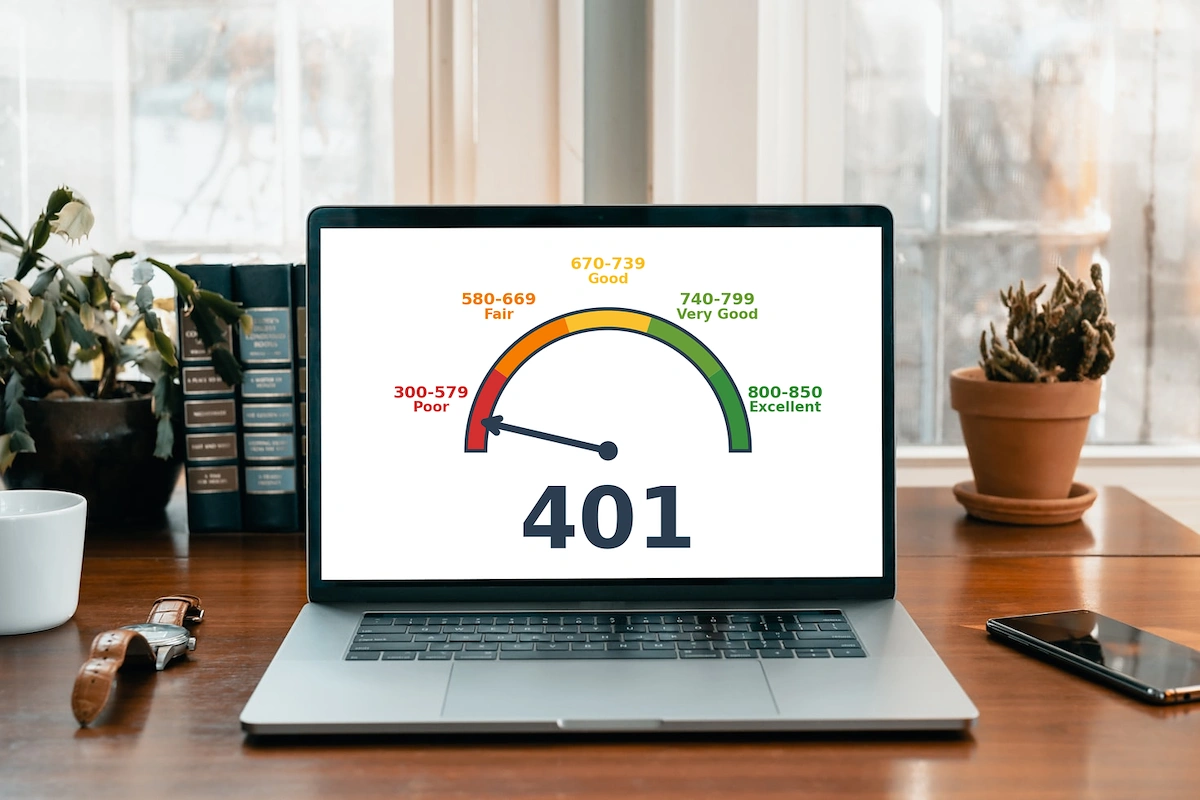
Kudos has partnered with CardRatings and Red Ventures for our coverage of credit card products. Kudos, CardRatings, and Red Ventures may receive a commission from card issuers. Kudos may receive commission from card issuers. Some of the card offers that appear on Kudos are from advertisers and may impact how and where card products appear on the site. Kudos tries to include as many card companies and offers as we are aware of, including offers from issuers that don't pay us, but we may not cover all card companies or all available card offers. You don't have to use our links, but we're grateful when you do!
401 Credit score: What You Need to Know in 2026
July 1, 2025


TL;DR
A 401 credit score provides a clear starting point for building a stronger financial future, though it presents some initial hurdles. This score falls into the "Poor" FICO category, which means there are straightforward opportunities to make impactful improvements.
What Does a 401 Credit Score Mean?
A credit score of 401 falls squarely into the "poor" category on the FICO scale, which ranges from 300 to 850. This number signals to lenders that you are a high-risk borrower, likely due to a history of significant financial difficulties like late payments or defaults. It's a snapshot of your past credit behavior that heavily influences a lender's decision to extend credit.
Financially, a 401 score makes it tough to get approved for new loans or credit cards. Any offers you do get will probably have steep interest rates and strict terms, impacting everything from car loans to apartment applications. While the situation is challenging, it's not a dead end. This score can be the starting point for rebuilding your credit and moving toward a healthier financial outlook.
Who Has a 401 Credit Score?
While age isn't a direct factor in calculating your credit score, there is a clear correlation showing scores improve over time. According to 2023 data, here is a breakdown of the average credit scores by generation:
- Generation Z (ages 18-26): 680
- Millennials (ages 27-42): 690
- Generation X (ages 43-58): 709
- Baby Boomers (ages 59-77): 745
- Silent Generation (ages 78+): 760
Credit Cards With a 401 Credit Score
A credit score of 401 falls into the "very poor" range, which can significantly hinder your ability to qualify for most traditional credit cards. Lenders view this score as an indicator of high risk, making them hesitant to extend unsecured credit due to concerns about repayment. Consequently, your options will likely be restricted to products designed for building credit, such as secured cards that require a cash deposit.
To find a card that fits your situation, Kudos provides an Explore Tool that uses a "preference matching" feature to suggest cards based on your specific needs, such as building credit. The tool sifts through a database of nearly 3,000 options to provide personalized, unbiased recommendations, allowing you to compare cards suitable for your credit profile.
Auto Loans and a 401 Credit Score
A 401 credit score places you in the deep subprime category, which means that while you may still get approved for an auto loan, it will be on less favorable terms. You can expect to face significantly higher interest rates, making your loan much more expensive over its lifetime.
According to a 2025 market analysis, average auto loan rates break down by credit score as follows:
- Super-prime (781-850): 5.25% for new cars and 7.13% for used cars
- Prime (661-780): 6.87% for new cars and 9.36% for used cars
- Non-prime (601-660): 9.83% for new cars and 13.92% for used cars
- Subprime (501-600): 13.18% for new cars and 18.86% for used cars
- Deep subprime (300-500): 15.77% for new cars and 21.55% for used cars
Mortgages at a 401 Credit Score
A 401 credit score falls significantly below the minimum threshold for most home loans. Lenders offering conventional mortgages typically look for a score of at least 620. Even FHA-insured loans, which are more accessible, generally require a minimum score of 500, making it highly unlikely to qualify with a 401.
If you find a specialty lender, expect steep consequences. A very poor credit score leads to much higher interest rates and fees, substantially increasing the long-term cost of your home. You would also face stricter requirements, such as a larger down payment and a lower maximum loan amount, which would limit your purchasing power.
What's in a Credit Score?
Figuring out what goes into your credit score can feel like trying to solve a complex puzzle, but it generally boils down to a handful of key elements. The most common factors include:
- Your history of making payments on time is the most significant factor.
- How much of your available credit you're currently using, known as your credit utilization ratio, plays a major role.
- The age of your credit accounts, including the average age and the age of your oldest account, is also considered.
- Lenders like to see that you can responsibly manage different types of credit, such as credit cards and loans.
- Opening several new credit accounts in a short period can be seen as a risk and may temporarily lower your score.
How to Improve Your 401 Credit Score
While a 401 credit score indicates significant financial challenges, it is absolutely possible to improve your standing with consistent effort. By taking deliberate, positive actions, you can rebuild your credit profile over time.
- Monitor your credit reports. You can get free reports from the major bureaus and should review them for inaccuracies, as removing errors can provide a quick boost to a low score.
- Establish automatic bill payments. Since payment history is the most significant factor in your score, making consistent, on-time payments is the foundational step to rebuilding your credit.
- Apply for a secured credit card. A secured card requires a deposit and is an accessible tool for individuals with poor credit to establish a positive payment history when other options are unavailable.
- Become an authorized user. Being added to the account of a trusted person with a good credit history can help by adding their positive payment record to your report and improving your credit mix.
To help manage your cards and maximize your spending, you can use a financial companion tool like Kudos to support your credit-building journey.
Unlock your extra benefits when you become a Kudos member

Turn your online shopping into even more rewards

Join over 400,000 members simplifying their finances

Editorial Disclosure: Opinions expressed here are those of Kudos alone, not those of any bank, credit card issuer, hotel, airline, or other entity. This content has not been reviewed, approved or otherwise endorsed by any of the entities included within the post.



































.webp)







